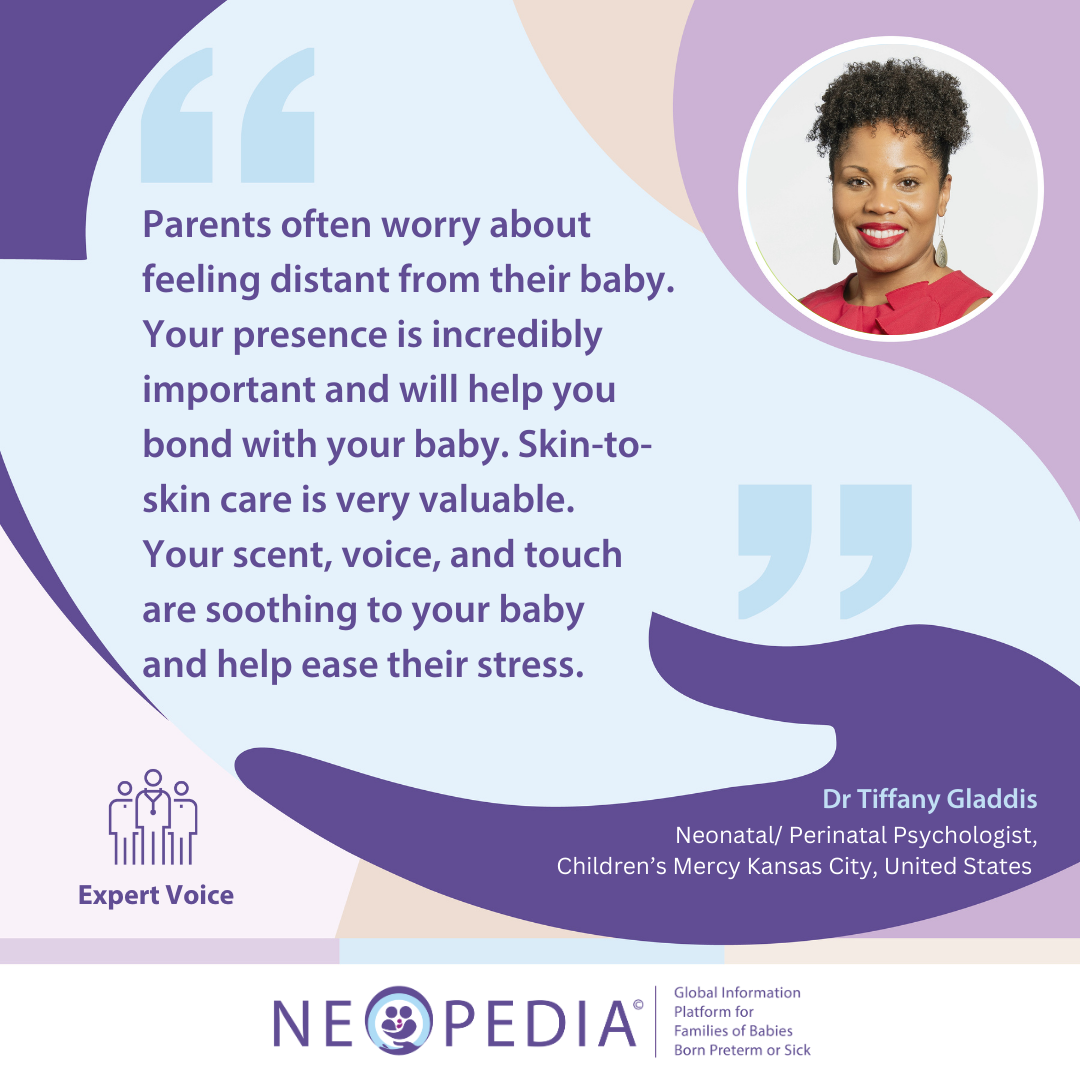
The time you spend with your baby in the neonatal unit can seem overwhelming, especially with the many challenges that may come up. The stress of balancing work, finances, isolation, and worries about your baby’s health can all add to the emotional load. Healthcare providers, including doctors, nurses, and social workers⍰, are there to support you through these challenges and help you feel more involved in your baby’s care. Many neonatal units also offer parent groups, patient schools and incubator⍰ support from mentor parents where you can meet others and find support.
Bonding with your baby
Parents often worry about feeling distant from their baby. Your presence is incredibly important and will help you form a close connection (bond) with your baby. Skin-to-skin care is very valuable. Your scent, voice, and touch are soothing to your baby and help ease their stress. You can also sing or talk and read to your baby, while sitting beside the incubator or during skin-to-skin time. Hearing your voice brings comfort and connection to your baby.
Coping strategies
Think about how you have handled tough times before. Talking to others, seeking advice, or writing down your feelings can be helpful. As time goes on, the neonatal unit will feel less intimidating and engaging in activities like skin-to-skin contact, bathing, or feeding your baby will help you bond.
While advice from the internet, family, friends, preemie support guides, or the neonatal unit parent community can sometimes help you cope, there are times when changes in your mental health may require professional support. Family members may also help you access professional services to support you and your family. Struggling with mental health is not a sign of weakness or failure, and seeking help is a vital step for both your well-being and your baby’s safety. Many parents experience challenges with their emotional well-being after having a baby, especially when they have experienced a stay in the NICU. Health professionals understand that keeping families together is important, and it is very rare for families to be separated because of mental health concerns.
Recognizing signs to seek help immediately
It is important to recognize the signs that indicate a parent or caregiver may be unable to cope and needs immediate support. These include:
If you notice any of these signs in yourself or someone you know, it is essential to seek help immediately. Even if a parent cannot acknowledge these feelings, partners, family members, or friends can play an important role by alerting professionals.
Safeguarding is key
While mental health challenges do not mean you cannot be a good parent, ensuring the child’s safety is most important. If there are concerns about a caregiver’s ability to cope, professionals will take steps to ensure both the baby and the family are supported. If in doubt, always prioritize the child’s safety and reach out for help.
If you are still in the neonatal unit, consider speaking with someone from the healthcare team, for example one of the nurses. Nurses see you daily and understand the pressures parents face. They can give you information about counselling or psychological support on the unit. Some units have mental health professionals on staff, such as:
If help in the hospital is not available, you can speak to your general practitioner (GP)⍰. They can talk through your experiences and suggest therapies, treatments, or medications that might help.
When you are looking for professional help, you might feel nervous about what your healthcare professional will suggest. Not all mental conditions need medication – there are other options like psychoeducation⍰ or therapy, counselling, or mindfulness techniques. If you are worried, consider taking someone with you to your appointment for support. Your healthcare professional will work with you to find the best approach, so share any concerns you have.
Many breastfeeding mothers worry that taking medication might stop them from breastfeeding. If you are concerned, talk to your healthcare professional. They can help you find the best treatment options that work with breastfeeding.

